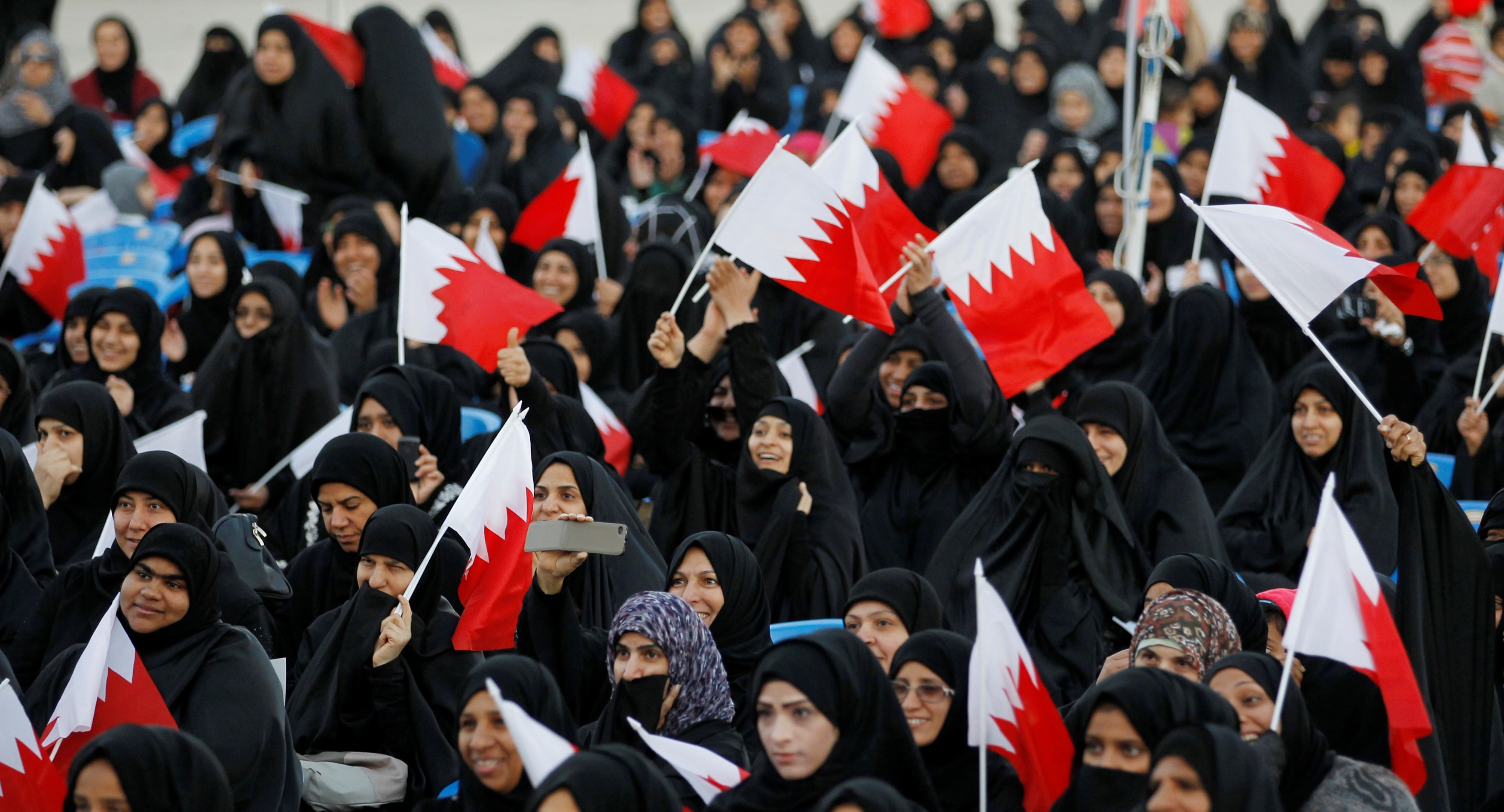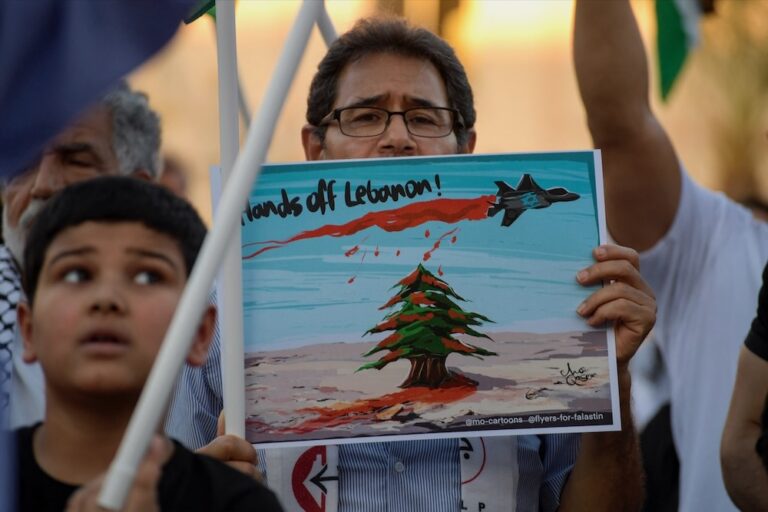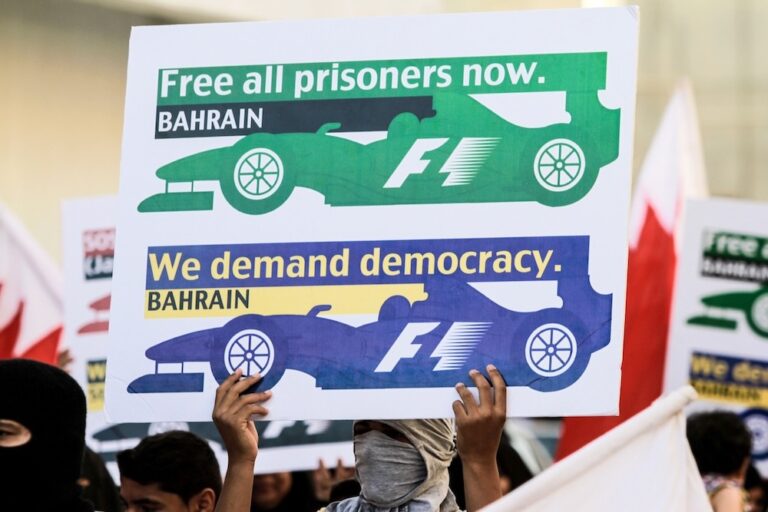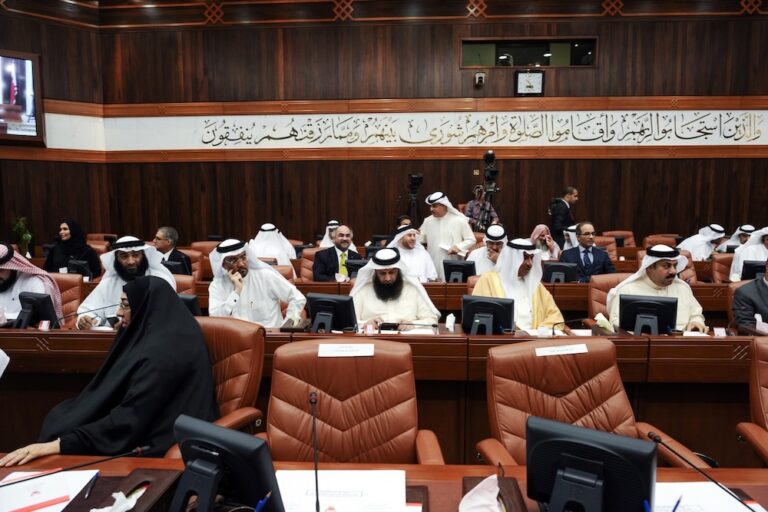Women activists in Bahrain don't have much to celebrate on International Womens Day as reports of torture, harassment, and arrests keep filtering out of the island kingdom.
(BCHR/IFEX) – On International Women’s Day, the Bahrain Center for Human Rights (BCHR) expresses its grave concern and condemnation over the continued violations of women’s rights in Bahrain.
Bahraini women, who have played an important role in the country’s uprising, calling for democracy and political reform, have been violently targeted by the authorities. At least 13 women were victims of extra-judicial killing since 2011. Many were detained, tortured and sentenced to years in prison. Today, there are several women in prison over politicized and false charges of illegal gathering, helping the injured, and exercising their rights to freedom of expression.
It is important to note that the cases presented in this report are just a sample of hundreds of other cases in regards to arrests, harassment, sackings, beatings and torture of women in Bahrain.
Extra-Judicial Killings
At least 13 women died as a result of authorities’ use of excessive force, teargas and intimidations since 14 February 2011. No one has been held accountable for any of these deaths. Teargas is the number one cause of death amongst women; 70 per cent of those who died succumbed to the authorities’ targeting of citizens’ homes and theirexcessive use of teargas on a daily basis.
In the last year, eight deaths were recorded including:
- Khadija Mohammed from Maameer who died on 5 April 2012 after spending three months in the Intensive Care Unit (ICU);
- Sakeena Marhoon, in her 70s, suffered from side effects of repeated inhalation of teargas thrown inside her house several times. She was hospitalized several times before her death on 6 March 2012;
- Zahraa Al Hawaj, 69-years-old, from Noaim, was exposed to teargas multiple times. Her health deteriorated and she was admitted to the ICU. She suffered inflammation of the lungs and died on 1 February 2012;
- Salma Mohsen, 81-years-old, died on 15 Jan 2012 by suffocation from teargas after it was shot into her home;
- Fakhriya Al Sakran, 55-years-old, was taken to the hospital and admitted to the ICU after regularly being exposed to teargas. Doctors told the family that she died on 3 January 2013 as a result of shortness of breath, they couldn’t save her life.
Two years after the death of Bahia Al Aradi, a 51-year-old nurse who was the first female killed by the authorities, no one has yet been held accountable for her death. She was driving on Budaiya road when she went missing on 16 March 2011. Her family contacted all hospitals but were unable to find her. They then received a call from the authorities informing them that she was at the Bahrain Defense Force hospital on life support. Only her brother was allowed to visit for a few minutes.
On 20 March 2011, Bahiya passed away. The authorities stated in her death certificate that she died of brain injury. The Bahrain Independent Commission of Inquiry (BICI) report confirmed that her death was caused by a gunshot to the back from a distance of 50 to 75 meters. Her case was never brought to court.
Arrests, detention and trials
Dozens of women have been arrested and detained in Bahrain. Today several women remain in prison over charges related to freedom of expression and peaceful assembly.
Many of them were brutally arrested and attacked during peaceful protests, including Zahra AlShaikh who has been in detention for over 45 days pending trial after she was arrested at a protest in Manama.
In the last year, the renowned Bahraini activist, Zainab Al Khawaja, was arrested several times for participating in peaceful protests. She was most recently arrested on 27 February 2013 after staging a one-person protest in front of Hamad bin Salman’s palace and throwing 6 eggs at the palace gate, holding a sign saying “you’ve arrested our fathers and children, even our bodies. Let your palaces hear, your prisons are not feared”.
She was protesting against the culture of impunity and the lack of accountability in the security forces. Al Khawaja was charged with obstructing traffic, damaging property, inciting hatred against the regime, and prejudice to authority.
Earlier on, the court upheld a one-month prison sentence against her of which she had already served eight days for entering a restricted area (the Pearl Roundabout area) and three months on a charge of damaging MOI property (tearing a photo of Prince Hamad bin Salman Al-Khalifa).
In regards to the case of insulting a public officer, which Zainab was previously acquitted of all charges for, the verdict was overturned and she was sentenced to three months’ imprisonment. The court has been impartial in the cases against Zainab, her lawyer was not given the chance to present his defense in one of the cases and in another case, witnesses and official documents were overlooked by the court. Zainab has already spent around four months in prison for other cases and she has another four cases active in court against her (full list of cases). Now, she is serving three months and 22 days according to her lawyer .
Halima Al Sabagh is a dental assistant who was arrested from her workplace in Salmaniya Hospital in 2012 for allegedly taking first-aid medicine to treat injured protesters whose injuries were caused by security forces’ use of excessive force. She was detained for three weeks pending investigation on the charge of exploiting her job. On 18 September 2012, she was sentenced to one year in prison and a BD100 fine (US$256). She was arrested on 15 October 2012 while attending her appeal to serve her sentence. She has been imprisoned for more than five months on trumped up charges.
Siddiqa AlBasri, a 25-year-old mother of two, was arrested on 28 January 2013 and is currently serving a six-month prison sentence for allegedly insulting a police officer and disobeying orders, on the background of an earlier arrest from a checkpoint during the national safety status in April 2011 when she tried to leave her car and walk away from the checkpoint. The officers pursued her, assaulted her and finally arrested her on the charge of disobeying their orders and insulting security forces for reportedly saying: “I’m from Sitra and I fear only God.” Al-Basri was never presented with the opportunity to defend herself at any stage of the trial and appeal process.
On 16 January 2013, Zainab Abduali Taraif, a 20-year-old honors university student, was arrested briefly after she stood silently near the financial harbor, holding a banner with her academic results and honor certificates, to protest against her second expulsion from the University of Bahrain.
The nightly house raids and arrests of women are still on-going. Munira Sayed Habib, 27-years-old, was arrested violently in the early morning hours (3 am) on 28 November 2012, when her house was raided in Al-Ghuraifa by groups of special security forces backed with armed and masked civilians. She was held until 1 December 2012 for no clear reason before being released without charges.
Five women were sentenced to six months in detention on 17 January 2013 on the charge of illegal gathering. Being subjected to harassment and fearing early-morning house raids, they turned themselves in to serve the unjust prison sentence. The five women are:
- Fatima Al-Naino, 17-years-old, is a high school student. She fell behind a year in her studies because of the harassment she has been subjected to;
- Khadija Hubail, 16-years-old, is in her last year of high school. She plans to study medicine. She fears her schooling will be affected when it is time to apply for university and she will probably be denied a good conduct certificate which is required by all universities;
- Zainab Duhaim, 21-years-old, is engaged to be married and was studying at the university until she was forced to withdraw due to harassment;
- Fatima Al Jishi, 22-years-old, a university graduate, was unable to seek employment or enroll in further education fearing violent arrest at any time;
- Aqeela Al-Muqabi, 25-years-old, is a university graduate seeking employment who fears unexpected violent arrest.
Harassment, dismissal and stripping of nationality
Jalila Al Salman, vice president of the Bahrain’s Teachers’ Association (BTA), was arrested three times, tortured and detained for six months. Recently, she received a letter from the Ministry of Education, where she works, detailing that she has been fired.
Despite her case still being at the Court of Cassation. She has been targeted by the pro-government media with smear campaigns calling for putting her on trial again on the background of her activism at the UN Human Rights Council. Jalila Al Salman was previously sentenced by a military court to three years in prison in 2011, later reduced on 22 October 2012 to six months’ imprisonment, on charges of, among other things, inciting hatred against the regime, calling for a teachers strike, as well as participating and calling for illegal gatherings. BCHR believes that these are politically motivated charges; linked closely to the role that the Teachers Association has played since the beginning of the popular uprising in Bahrain.
Hundreds of women were subjected to sackings in Bahrain due to their participation in pro-democracy protests.
On 1 March 2013, Ramla Abdulhameed, a journalist, political activist and Al Wefaq political society shura member, was denied entry to Egypt. Her passport was taken and she was held at Cairo International Airport for three hours. It is believed that the Bahraini authorities are sending a black list of Bahraini activists and journalists to be denied entry.
Also, Reem Khalifa, an associate press office manager in Bahrain, was denied entry to Dubai when she was visiting with her husband. The same incident happened to other human rights activists like Dr. Nada Dhaif, head of BRAVO, who was denied entry to Kuwait and Maryam Al Khawaja, the acting president of BCHR, who was denied entry to Egypt.
One woman, Mariam Sayed Ibrahim Hussein Redha , is among 31 Bahraini who were stripped of their nationality in November 2012 without any prior notice and without judicial process, contrary to customary international law.
Impunity for the abusers
On 22 October 2012, a Bahraini court acquitted a female police officer for torturing France 24 Correspondent Nazeeha Saeed after a series of adjournments that lasted for more than a year. Having reported on pro-democracy demonstrations held at Bahrain’s Pearl Roundabout in the spring of 2011, Saeed was called into a Bahraini police station for questioning in May 2011. There, she was blindfolded, kicked, punched, and slapped. Her hair was pulled, she was whipped with plastic tubing, had a shoe forced into her mouth and her head dunked into a toilet. An unknown, caustic liquid said to be urine was poured onto her face, she was repeatedly insulted and mentally abused and asked to make a false confession. Three independent medical reports, two of which were from Bahraini government doctors, corroborate Saeed’s account of the torture she suffered while in custody.
Another example is the case of Dr. Fatima Haji, a 34-year-old mother of two boys. She is an internal medicine rheumatology specialist. Fatima was arrested from her home around midnight on 17 April 2011. During her detention, which lasted 21 days three of which were in solitary confinement, Fatima was subjected to different types of torture: slapping on the face, severe beatings, beatings with a rubber hose on the feet, electrocution to the head, sleep deprivation, standing for long hours without food or drinks, prevention from using a toilet, hanging from wrists, threats of execution and rape and threats to kill her children. Fatima was then sentenced to five years in prison by a military court on trumped up charges.
She was later found innocent, but the Ministry of Health refuses to reinstate her, as she is suspended from work; and she is prohibited from private work. Noura Al-Khalifa, a member of the ruling family, took part in Fatima’s arrest and torture. A case was filed against Noura, then dropped after the first hearing. It is important to note that Dr. Fatima Haji is only one of a large number of female medics subjected to arrests, torture, sackings harassment.
Women in Bahrain have been victims of countless human rights violations by the authorities. They have been arrested, detained, tortured and harassed. On International Women’s Day, BCHR appeals to the international community and women rights’ groups to immediately demand of the Bahraini authorities to:
- Hold those responsible in the security forces and government positions for the killing and torture of women accountable;
- Release female political prisoners drop charges against them;
- Investigate the torture cases against women;
- Put an end to the harassment/targeting and defamation campaigns carried out against female activists;
- Abide by international human rights laws to eliminate violence against women.



